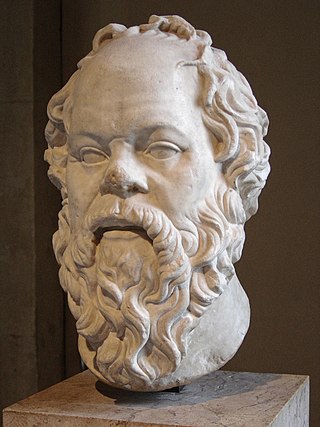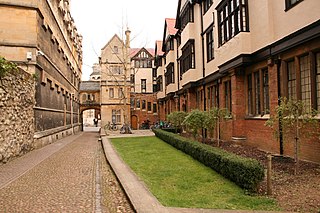A Logician is an expert or student of logic
A Logician may also refer to:
- A follower of the School of Names
- A Logician Devil , a 1951 painting by Salvador Dalí
- Logician (horse) (foaled 2016), a British thoroughbred horse
A Logician is an expert or student of logic
A Logician may also refer to:

A syllogism is a kind of logical argument that applies deductive reasoning to arrive at a conclusion based on two propositions that are asserted or assumed to be true.
In logic, the semantics of logic or formal semantics is the study of the semantics, or interpretations, of formal languages and natural languages usually trying to capture the pre-theoretic notion of logical consequence.
Johan van Benthem may refer to:

Logic in computer science covers the overlap between the field of logic and that of computer science. The topic can essentially be divided into three main areas:
Gaṅgeśa was an Indian philosopher, logician and mathematician from the kingdom of Mithila. He established the Navya-Nyāya school. His Tattvachintāmaṇi, also known as Pramāṇacintāmaṇi, is the basic text for all later developments. The logicians of this school were primarily interested in defining their terms and concepts related to non-binary logical categories.
Inclusion or Include may refer to:
Early Islamic law placed importance on formulating standards of argument, which gave rise to a "novel approach to logic" in Kalam . However, with the rise of the Mu'tazili philosophers, who highly valued Aristotle's Organon, this approach was displaced by the older ideas from Hellenistic philosophy. The works of al-Farabi, Avicenna, al-Ghazali and other Muslim logicians who often criticized and corrected Aristotelian logic and introduced their own forms of logic, also played a central role in the subsequent development of European logic during the Renaissance.
The development of Indian logic dates back to the anviksiki of Medhatithi Gautama ; the Sanskrit grammar rules of Pāṇini ; the Vaisheshika school's analysis of atomism ; the analysis of inference by Gotama, founder of the Nyaya school of Hindu philosophy; and the tetralemma of Nagarjuna.
William of Sherwood or William Sherwood, with numerous variant spellings, was a medieval English scholastic philosopher, logician, and teacher. Little is known of his life, but he is thought to have studied in Paris, was a master at Oxford in 1252, treasurer of Lincoln from 1254/1258 onwards, and a rector of Aylesbury.
John Woods may refer to:

Logic Lane is a small historic cobbled lane that runs through University College in Oxford, England, so called because it was the location of a school of logicians. It links the High Street at the front of the college with Merton Street to the rear, which is also cobbled. Logic Lane covered bridge is a short covered bridge over the lane at the High Street end. To the west of the lane are the Radcliffe Quad and the Master's Lodgings. To the east are the 1903 Durham Buildings and the Goodhart Quad. The lane is locked at night, with gates at each end. It is mainly used by pedestrians, but vehicular access is possible.
Supposition theory was a branch of medieval logic that was probably aimed at giving accounts of issues similar to modern accounts of reference, plurality, tense, and modality, within an Aristotelian context. Philosophers such as John Buridan, William of Ockham, William of Sherwood, Walter Burley, Albert of Saxony, and Peter of Spain were its principal developers. By the 14th century it seems to have drifted into at least two fairly distinct theories, the theory of "supposition proper", which included an "ampliation" and is much like a theory of reference, and the theory of "modes of supposition" whose intended function is not clear.
Horseshoe is a shoe for horses and by analogy is applied to many things with a similar shape.
Quine may refer to:
Imperative logic is the field of logic concerned with imperatives. In contrast to declaratives, it is not clear whether imperatives denote propositions or more generally what role truth and falsity play in their semantics. Thus, there is almost no consensus on any aspect of imperative logic.
Connexive logic is a class of non-classical logics designed to exclude the paradoxes of material implication. The characteristic that separates connexive logic from other non-classical logics is its acceptance of Aristotle's thesis, i.e. the formula,
Geoffrey Hunter may refer to:

A logical symbol is a fundamental concept in logic, tokens of which may be marks or a configuration of marks which form a particular pattern. Although the term "symbol" in common use refers at some times to the idea being symbolized, and at other times to the marks on a piece of paper or chalkboard which are being used to express that idea; in the formal languages studied in mathematics and logic, the term "symbol" refers to the idea, and the marks are considered to be a token instance of the symbol. In logic, symbols build literal utility to illustrate ideas.
Gabbay may refer to:
Dudman may refer to: